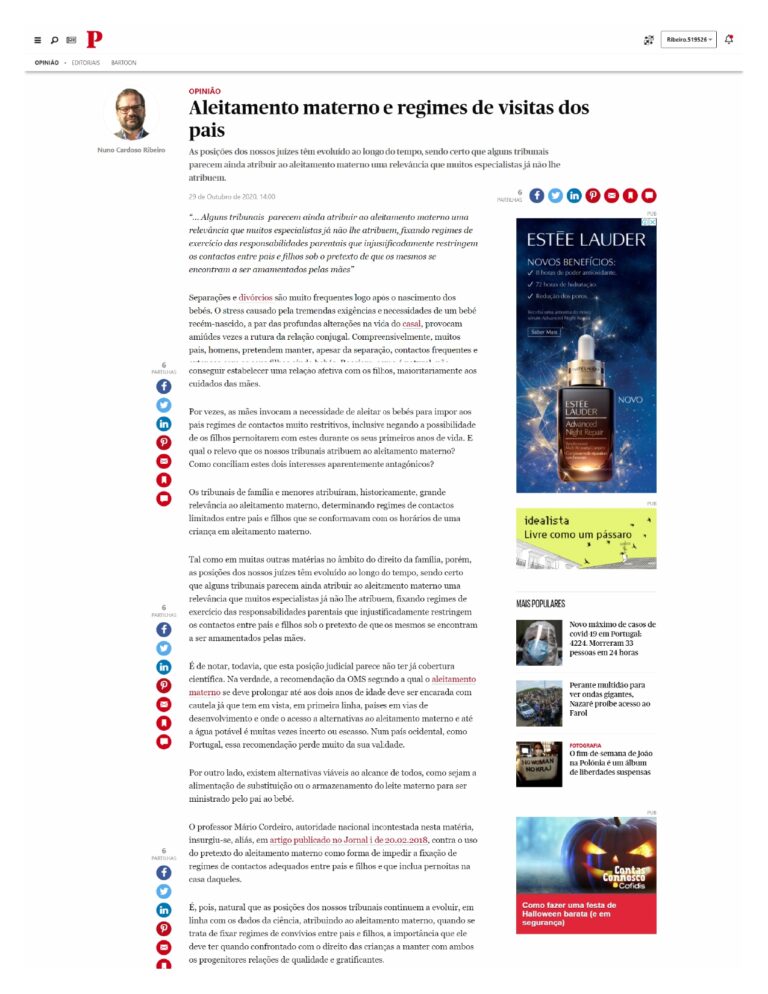Opinion article by our coordinator, Nuno Cardoso-Ribeiro in Público on 10/29/2020 regarding breastfeeding and parental visitation regimes. Read the article on the Público website or the translation and pdf below:
“Breastfeeding and parental visitation regimes
The positions of our judges have evolved over time, and it is certain that some courts still seem to attribute to breastfeeding a relevance that many specialists no longer attribute to it.
“…Some courts still seem to attribute to breastfeeding a relevance that many specialists no longer attribute to it, establishing regimes for the exercise of parental responsibilities that unjustifiably restrict contacts between parents and children under the pretext that the latter are being breastfed by their mothers”.
Separations and divorces are very frequent right after babies are born. The stress caused by the tremendous demands and needs of a newborn baby, along with the profound changes in the life of the couple, often leads to the breakdown of the marital relationship. Understandably, many times the marital relationship breaks down. Understandably, many fathers want to maintain frequent contact with their children, despite the separation, and to be able to establish a loving relationship with them, mostly in the care of their mothers.
Mothers sometimes invoke the need to breastfeed their babies to impose very restrictive contact regimes on fathers, even denying the possibility of the children spending the night with them during their first years of life. And how much importance do our courts give to breastfeeding? How do they reconcile these two apparently antagonistic interests?
Family and childrens courts have historically placed great importance on breastfeeding, determining limited parent-child contact regimes that conformed to the schedule of a breastfeeding child.
As in many other family law matters, however, the positions of our judges have evolved over time, and it is true that some courts still seem to give breastfeeding a relevance that many experts no longer attribute to it, setting regimes for the exercise of parental responsibilities that unjustifiably restrict contacts between parents and children under the pretext that the latter are being breastfed by their mothers.
It should be noted, however, that this judicial position seems to have no scientific coverage. In fact, the OMS recommendation that breastfeeding should be extended until two years of age should be viewed with caution since it primarily targets developing countries and where access to alternatives to breastfeeding and even drinking water is often uncertain or scarce. In a western country, such as Portugal, this recommendation loses much of its validity.
On the other hand, there are viable alternatives within everyone’s reach, such as replacement feeding or the storage of breast milk to be administered by the baby’s father.
Professor Mario Cordeiro, an undisputed national authority on the subject, in an article published in the Jornal i on 20.02.2018, spoke out against the use of breastfeeding as a pretext to prevent the establishment of adequate contact between parents and children, including overnights at their homes.
It is therefore natural that the positions of our courts continue to evolve, in line with scientific data, giving breastfeeding, when it comes to setting regimes of conviviality between parents and children, the importance it should have when confronted with the right of children to maintain with both parents quality and rewarding relationships.”
